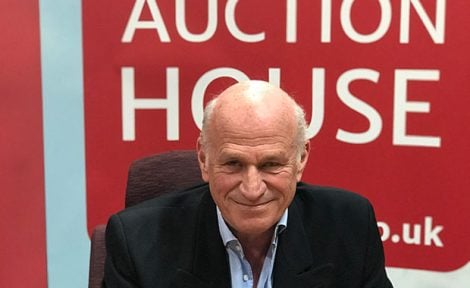The evolution of auction
Richard Reed explores the options – and the fierce debate – about the different property auction methods available to agents.

However, there’s another radical shake-up under way on the auction scene, and that is the rapidly growing market share being gained by what is known as the Modern Method of Auction (MMoA). With MMoA, a buyer has to stump up a reservation fee, typically around 3.5 per cent of the sale price (but with a minimum of usually £5,000 + VAT), for which they gain the exclusive right to buy the property – and crucially, have usually about two months in which to complete.
However, if the buyer has to pull out for any reason, other than the property being un-mortgageable, they usually lose their deposit. With an average UK house price in August 2022 of £294,000, that could leave them more than £10,000 (+VAT) out of pocket.
Fierce criticism
The Modern Method has come in for fierce criticism, both from traditional auctioneers who say there is still no guarantee of a sale, and from those who say the size of fees being asked are excessive and motivated purely by profit. Iamsold, one of the largest practitioners of the Modern Method, has just bought the MMoA book of SDL Property Auctions and is now responsible for 0.5 per cent of all UK property transactions.
 “The private treaty process is somewhat archaic; it’s dysfunctional, it’s time consuming, and it’s inherently risky,” says Managing Director Jamie Cooke. “Why wouldn’t people be more in tune with a solution that when a sale is agreed at a price within eight weeks it’s going to go through, and there’s a less than five per cent chance of that falling out of bed.
“The private treaty process is somewhat archaic; it’s dysfunctional, it’s time consuming, and it’s inherently risky,” says Managing Director Jamie Cooke. “Why wouldn’t people be more in tune with a solution that when a sale is agreed at a price within eight weeks it’s going to go through, and there’s a less than five per cent chance of that falling out of bed.
“The benefit MMoA brings for a residential seller is to get the benefit of speed and security, but they don’t have to limit their buyer pool so substantially [as a traditional auction] because they can give a buyer the time to get traditional residential finance,” he explains.
About 40 per cent of our buyers used a high street residential mortgage – it means we’ve got a larger pool of potential purchasers. Jamie Cooke, Iamsold.
“About 40 per cent of our buyers used a high street residential mortgage – it means we’ve got a larger pool of potential purchasers, which means you don’t limit the price as you would do in an unconditional sale.
“Ultimately we’re here to bring an auction solution to a residential seller. If they want to sell a house by private treaty they’ve got to put it on the market and it’s going to take 24 weeks to complete once they’ve agreed a sale, with the inherent risk of it falling through.”

‘Motivated by fees’
In contrast, Andrew Parker, Managing Director of SDL Property Auctions, which conducts livestream auctions, believes MMoA is “motivated by a higher level of fees”. He continues, “Modern Method isn’t a sale, it’s creating a reservation agreement that’s a conditional sale. It doesn’t have the benefits of an auction sale. The benefits to the buyer and seller aren’t really there because, yes, they’ve paid some money, but if things don’t go anywhere that is retained by the provider of that service and the agent – there is no benefit to the vendor.
“I really don’t like the term ‘modern method’ because it implies that the other method is not a modern method – and the word ‘traditional’ isn’t great either.
“For me, an auction is where a competitive bidding environment is created, whether that be online, in a room, livestream – however you create it – whereby on the fall of a hammer, whether electronic or real, a sale is created where both the buyer and seller are legally committed to the sale and the purchase.”
He adds, “In a real auction, if the buyer were to walk away at the end of the completion period and say ‘I can’t proceed’ then the vendor would receive the ten per cent deposit, so there’s some ‘hurt’ money in it. Otherwise, what you are asking the vendor to do in this MMoA world, is take all the risks, maybe be not achieving the price they would have done and then if the buyer chooses not to proceed, they have to go back to the beginning. I just don’t think that’s fair.
“It had an appeal in the market we’ve been in where there is very limited stock; people are happy to pay these reservation fees but it doesn’t sit well with me.”
A role for both methods
 Dough Haigh, at Whoobid Property Auctioneers, conducts both traditional auctions via an eBay-style format and the MMoA, and believes both have a role to play. “I think we are seeing massive problems with getting cases through the conveyancing process at the moment but with an auction contract, whether modern or traditional, there are fixed timescales that everyone is working to,” he states.
Dough Haigh, at Whoobid Property Auctioneers, conducts both traditional auctions via an eBay-style format and the MMoA, and believes both have a role to play. “I think we are seeing massive problems with getting cases through the conveyancing process at the moment but with an auction contract, whether modern or traditional, there are fixed timescales that everyone is working to,” he states.
“Ultimately, I would say in our experience we have great success with MMoA. The main benefits are the security element, but also that it opens it up to mortgage buyers. In an industry where we are struggling to get sales through, it enforces contract and obligations and timescales.”
In our experience we have great success with MMoA. The main benefits are the security element, but also that it opens it up to mortgage buyers. Doug Haigh, Whoobid.
“The biggest criticism is often fees being over the top, but in our experience, we’ve seen great success; we’re getting great buying commitment from it. Vendors, from what we’re seeing, tend to like that option and the reason they like it is because they are opening up the market to more buyers and hopefully they will see a better price at the back end of that auction.”
Haigh adds, “I like to think we are competitive, but I do agree there are some exceptional fees out there in the marketplace and unfortunately that does put people in tricky positions.”
Guaranteed results
 Over at Auction House UK, Managing Director Jeremy Prior thinks “there is a place” for the Modern Method, but he agrees with SDL Property Auctions’ Parker that only a traditional auction can guarantee results.
Over at Auction House UK, Managing Director Jeremy Prior thinks “there is a place” for the Modern Method, but he agrees with SDL Property Auctions’ Parker that only a traditional auction can guarantee results.
“With traditional auctions you get the security of sale at the fall of the gavel, whether that is a physical gavel or a virtual gavel – you have exchanged contracts and you complete within 28 days, or whatever period of time has been agreed,” he says.
Modern Method isn’t a sale, it’s creating a reservation agreement that’s a conditional sale. It doesn’t have the benefits of an auction sale. Jeremy Prior, Auction House .
“You don’t get security of sale to the same degree as with unconditional auctions, you certainly don’t get the speed of sale, and also I believe that the format they are adopting is very geared towards the purchaser.
“I also think their fees are unsustainable frankly. They have a minimum charge of £5,000 at least, and that sounds great if you are a vendor and you don’t want to spend any money on the sale of your property, but it’s not working in the best interest of your vendor.
“What a lot of buyers do is they just deduct the amount of money they are going to be paying to the auctioneer from the amount of money they are prepared to offer on the property. So the vendor does not, in effect, get the best price for the property in my view.”
Prior believes the MMoA model is flawed. “With the system they are operating, they have to charge high fees purely because if they don’t, their model becomes unsustainable, because they have to take a share of the fee and the agent has to take a share of the fee.
“I think they forget who they are working for; I think they take a somewhat short-term view of it. What they don’t appreciate is that today’s buyer becomes tomorrow’s seller. And if they do a deal with a buyer who is unhappy about the amount of money they have to pay to the agent, they are not likely to come back.”
Livestreamed auctions
Auction House has moved from almost entirely in-room auctions pre-Covid, to livestreamed events today; Prior is not a fan of the eBay format. “At a live auction you do get the best price for a property because you are in a very competitive environment where you do tend to get extremely good prices, whereas with an online digital auction you don’t necessarily get the best price, I don’t think.”
 Meanwhile Neil McDonald, CEO of Town & Country Property Auctions, also believes that the traditional auction method brings security for the buyer. “We’re not knocking anybody else’s model, but we are more comfortable being able to give the certainty to the client of a legal exchange straight away.”
Meanwhile Neil McDonald, CEO of Town & Country Property Auctions, also believes that the traditional auction method brings security for the buyer. “We’re not knocking anybody else’s model, but we are more comfortable being able to give the certainty to the client of a legal exchange straight away.”
Like others, Town & Country has abandoned in-room auctions in favour of an eBay-style listing format. Like most such formats, it includes an anti-sniping tool that automatically extends the auction if someone bids in the last few seconds.
We’re not knocking anybody else’s model, but we are more comfortable being able to give the certainty to the client of a legal exchange straight away. Neil McDonald, Town & Country.
“MMoA works for some agents,” he notes. “But I don’t necessarily think it provides the service that I would like to provide for vendors or buyers, because there is no legal remit there. If you are putting down a reservation fee and you have this 28-day cooling-off period, I’m not sure how comfortable I am with that.
“I think if there is any buyer’s fee involved there has to be some kind of definitive time period and immediate exchange to give clarity to both sides.”
McDonald says he looked into the MMoA seven or eight years ago and tried it a few times, but I didn’t like it. “I didn’t feel comfortable with it,” he says. “There were circumstances that I came across where it was very difficult to establish why the buyer pulled out. It depends very much on the contract. If you’re going to do it you need to protect both parties so they know exactly what they are getting into.” He emphasises that the traditional auction is a secure sale. “I can’t see how the MMoA can offer the same.”
However, McDonald does agree that one advantage of MMoA is the extended period that buyers have in which to complete. “Watch this space!” he adds.
Perhaps the last word belongs with Jeremy Prior at Auction House UK: “We sold over £605m worth of property in 2021 and we’re on target to sell £700m this year. That is an enormous amount of property.
“There is a real appetite out there from both vendors and buyers to buy through the auction process because they are fed up to the back teeth with sales falling through.”
THE TECH ENABLER OF ONLINE AUCTIONS
Bamboo isn’t an auctioneer – but peer behind many estate agents’ auction listings and you will find the Bamboo engine at work. It’s a white-label auction tool that allows agents to customise a remarkably wide choice of auction requirements – ranging from a traditional unconditional auction to the Modern Method of Auction (MMoA). It uses a listing format – but don’t dare call it ‘eBay style’.
 “I don’t like calling it an eBay-style auction because it’s not,” emphasises founder Robin Rathore. “You’re comparing apples and pears. With Bamboo you have time extensions, you go through a much more rigorous process in terms of signing up and going through IP checks and putting your payment details in, and that’s just not what happens on eBay.”
“I don’t like calling it an eBay-style auction because it’s not,” emphasises founder Robin Rathore. “You’re comparing apples and pears. With Bamboo you have time extensions, you go through a much more rigorous process in terms of signing up and going through IP checks and putting your payment details in, and that’s just not what happens on eBay.”
We are opening up and tapping a demographic of buyers that hasn’t had access to auctions.
He says the listing-style format appeals to a more cautious type of buyer, who might be deterred by the cut-and-thrust of a livestream auction.
“Almost 50 per cent of our bidders and buyers are women,” he points out. “That has remained true since we started. We are opening up and tapping a demographic of buyers that hasn’t really ever had access to auctions before.”
 Rathore explains that agents have complete control over how they use the Bamboo technology. “They can choose to sell by conditional auction, by traditional auction, they can choose the length of time to sell – some at three-minute intervals from a list, some on a property-by-property basis. It’s all done from within their own website with their own branding. They don’t lose control over their vendor relationship, and the service and brand that they are building.”
Rathore explains that agents have complete control over how they use the Bamboo technology. “They can choose to sell by conditional auction, by traditional auction, they can choose the length of time to sell – some at three-minute intervals from a list, some on a property-by-property basis. It’s all done from within their own website with their own branding. They don’t lose control over their vendor relationship, and the service and brand that they are building.”
As from 1 October, agents will also be able to pull and push data from Reapit – whether or not they have a Bamboo login. “You might not have a contract with Bamboo but you will still be able to push your property in the Bamboo network and it will be displayed in the Bamboo marketplace. It’s a pay-as-you-go model where you can list properties for sale by online auction without having the tie-ins of a contract.”
The property will appear on the Bamboo site and the agent will be able to advertise it on Rightmove and Zoopla in the normal way. Rathore believes the MMoA is a good method of sale. “There are more benefits than disadvantages. It does, without question, bring speed, certainty and transparency to the sales process, which is desperately needed, but like anything it is only as effective and as reputable as the agent that is using it, and therefore for that reason we would encourage our agents not charge extortionate fees.” He says agents can determine strictness or leniency of the reservation fee and refund policy. “Some agents may feel uncomfortable about keeping the reservation fee where the property falls through, some agents are more strict about it.”
Bamboo has a standard set of terms used by 90 per cent of agents. The buyer has to pay the full reservation fee at the point the auction ends and they then have 20 working days to exchange unless otherwise agreed.





